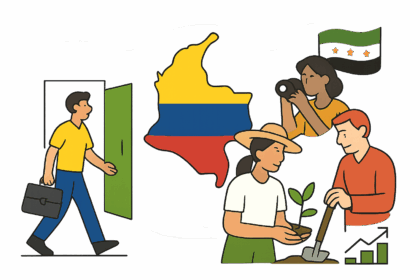
Redefining a Nation: How Did Colombia Transform Tourism and Agriculture into Growth Drivers?
- The importance of rebuilding the image for success in global markets.
- Exploiting latent resources as a basis for growth and economic development.
- The necessity of linking security and economic development to attract investments.
- Focusing on quality and innovation as essential elements for market distinction.
- The need for a long-term vision to successfully implement strategies.
Table of Contents
- Market Entry
- From Conflict to Beauty
- Agriculture: From Lands of Struggle to the World’s Breadbasket
- Tourism: From Risky Destination to Dream Destination
- Lessons Learned for Colombia and for Us at Insight Syria
- How Can “Insight Syria” Help?
Market Entry
Not just a commercial process, but a comprehensive transformation journey for nations, requiring strategic vision and a comprehensive redefinition of national identity. When we talk about “redefining a nation,” we refer to a country’s ability to overcome historical challenges, turn weaknesses into driving forces, and rebuild its image on the international stage, all through exploiting its latent potentials.
Colombia presents us with a unique and inspiring model in this field, having successfully transformed its security image, affected by decades of internal conflict, into a global success story, mainly relying on the tourism and agriculture sectors, making them key drivers of its economic and social growth.
From Conflict to Beauty: Colombia’s Journey in Restoring Confidence
For long decades, Colombia’s name was associated in global minds with a negative stereotype, often linked to armed conflicts, drug trade, and insecurity. This heavy legacy formed a massive barrier to any attempt to enter global markets, whether for its products or tourist appeal. The stereotype acted as a “closed market” to development and prosperity opportunities.
But the Colombian leadership, in cooperation with civil society and the private sector, realized that changing this image required a strategic and sustainable effort. It wasn’t just about improving the security situation on the ground, but about reshaping the national narrative, highlighting the bright and flourishing aspects of the country. This is the essence of “redefining the nation” – transforming suffering into a story of resilience, and turning challenges into opportunities.
This strategy included multiple and integrated steps:
- National reconciliation and rebuilding trust: Colombia initiated a long and complex internal reconciliation process, including peace agreements with armed groups, rehabilitation programs for former combatants, and strengthening the rule of law. These steps, despite their difficulties, were essential to restore internal and external confidence.
- Improving the security image: Efforts didn’t stop at agreements, but extended to intensive international awareness campaigns aimed at showcasing positive changes on the ground. The focus was on highlighting cities that became safe, areas that returned to normal life, and positive developments in human rights fields.
- Investing in infrastructure: The government realized that improving the security image wasn’t enough without strong infrastructure supporting economic growth, especially in the tourism and agriculture sectors. Large sums were invested in developing roads, airports, ports, and telecommunication networks, facilitating the movement of goods and people.
Agriculture: From Lands of Struggle to the World’s Breadbasket
Colombia has long enjoyed immense agricultural wealth, but decades of conflict limited its full exploitation. Instability and fear kept investors away, made market access difficult, and reduced productivity.
However, with the security situation improving, the agricultural sector turned into a major focus in the national “market entry” strategy:
- Colombian coffee: A global icon renewed: Colombia is famous for its high-quality coffee, but years of conflict affected its reputation. The government and producers worked to restore its global standing by:
- Ensuring quality and origin: Strict systems were developed to ensure coffee quality, protect origin designations, and enhance the “Colombian coffee” brand.
- Innovative marketing: Global marketing campaigns were launched focusing on the story of the Colombian farmer, the unique flavor, and the biodiversity of agricultural areas. Inspiring stories of farmers returning to their lands after years of displacement were used to create an emotional connection with consumers.
- Focus on sustainability: With the growing global awareness of environmental issues, Colombia invested in sustainable agricultural practices, enhancing its coffee’s appeal to markets interested in environmentally friendly products.
- Colombian flowers: An explosion of colors in global markets: The agricultural successes were not limited to coffee. Today, Colombia is one of the world’s largest flower exporters, especially in North American and European markets. This success is attributed to:
- Geographic location and ideal climate: Colombia offers ideal climatic conditions for cultivating a wide variety of flowers year-round, giving it a tremendous competitive advantage.
- Advanced technology: Producers invested in modern farming techniques, advanced irrigation systems, and post-harvest facilities to ensure high quality and competitiveness.
- Market access: Improved logistical infrastructure, particularly air shipping, helped Colombian flowers reach distant markets fresh.
- Other promising products: In addition to coffee and flowers, Colombia is working on developing exports of other agricultural products such as tropical fruits (avocado, papaya, mango), cocoa, and some types of vegetables, leveraging the country’s vast biodiversity.
Tourism: From Risky Destination to Dream Destination
Perhaps the most surprising transformation in Colombia is in the tourism sector. From a country avoided by many due to security concerns, it has become today one of the most attractive tourist destinations in Latin America, drawing international investments in this sector.
This transformation wasn’t a coincidence, but the result of a well-studied strategy for “global tourism market entry”:
- Changing the negative image: The biggest challenge was breaking the negative stereotype. This was done through:
- Bold marketing campaigns: Campaigns like “Be Curious, Not Afraid” (Colombia: Be Curious, Not Afraid) were launched to encourage visitors to see the real Colombia.
- Showcasing diversity: Focus was on the immense diversity Colombia offers: Caribbean beaches, Amazon rainforests, towering Andes mountains, vibrant historical cities (like Cartagena, Medellin, Bogota), and picturesque agricultural areas (like the Coffee Valley).
- Positive stories: Highlighting local success stories, positive developments in cities, and the warm welcome offered by the Colombian people.
- Improving tourism infrastructure: Significant investments were made in developing hotels, restaurants, tourist transportation, and training hospitality sector workers. Additionally, focus was placed on developing eco-tourism resorts and destinations that focus on cultural and natural experiences.
- Peace and security as an attraction factor: Paradoxically, security improvement became a major draw for tourists. Cities once considered dangerous, like Medellin, have redefined themselves as cities of innovation, culture, and tourism, transforming from “restricted areas” to “vibrant urban destinations.”
- Sustainable and specialized tourism: Colombia is moving towards developing new types of tourism, such as eco-tourism, adventure tourism, cultural tourism, and knowledge tourism (like visiting coffee farms or art workshops). This diversity serves a wide range of travelers and increases economic returns.
Lessons Learned for Colombia and for Us at “Insight Syria”
Colombia’s story offers valuable lessons on “market entry” and redefining national identity, lessons that “Insight Syria” can draw from and apply in the context of its clients:
- The importance of rebuilding the image: No market, whether a commercial market, a tourism market, or an investment market, can fully open its doors if the prevailing mental image is negative. It requires a strategic, diplomatic, and marketing effort to reshape this image.
- Optimal exploitation of latent resources: Every country and every market has unique resources. In Colombia’s case, agriculture (coffee, flowers) and natural sites and rich culture were the pillars. It requires careful research and analysis to identify these resources and strategize their exploitation.
- Linking security and economic development: Economic development, especially in sensitive sectors like tourism and agriculture, cannot be separated from the security situation. Improving security is not just a societal demand, but a prerequisite for attracting investments and tourists.
- Focus on quality and innovation: Competition in global markets is intense. Success requires offering high-quality products and services, with a focus on innovation to distinguish oneself from competitors.
- Using data and analytics: To achieve these transformations, it was necessary to rely on data: data on security, data on the market, data on consumers, data on competitors. At “Insight Syria,” we believe that precise data analysis is the compass for success in any successful “market entry” strategy.
- Long-term vision: These transformations didn’t happen overnight. They required years of diligent work, strategic planning, and perseverance.
How Can “Insight Syria” Help?
At “Insight Syria,” we understand the unique challenges facing the region, and we are equipped to offer specialized services to help institutions and organizations understand local and regional markets, overcome obstacles, and achieve their goals. Whether you are a government seeking to develop new economic sectors, an international organization seeking to understand the social and political context, or a company aiming for market entry in Syria or other regional markets, we offer:
- In-depth market research: We obtain accurate and comprehensive data on consumer behavior, market trends, competitors, and available opportunities.
- Data analysis and trends: We use the latest technologies to analyze complex data and provide actionable insights that support decision-making.
- Public opinion surveys: We measure public opinion on social, political, and economic issues, helping understand the pulse of society and guiding policies.
- Strategic consulting: We offer tailored advice on market entry strategies, business development, and risk management, based on a deep understanding of the local context.
- Analysis of the social and political environment: We assist in understanding the complexities of the social and political environment, assessing associated risks and opportunities.
Colombia’s story is a testament to the power of will and the right strategy. It is proof that market entry, whether an international market or a domestic development market, can be a transformation journey. At “Insight Syria,” we are committed to helping our clients write their own success stories, supported by data and deep insights, committed to the highest standards of quality and professionalism. We are here to empower you to understand the market, redefine your presence, and achieve sustainable growth.



